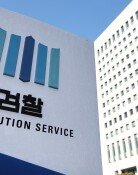Have the aspirations of 4.19 been fulfilled?
Have the aspirations of 4.19 been fulfilled?
Posted April. 19, 2001 13:05,

My favorite stamp in my entire collection turns 40 years old today. The stamp would not win any design awards or popularity contests. Some might even say that it is ugly. Yet, among the more than 6000 stamps issued by North and South Korea since 1945, it is the only stamp that fully captures the Korean people’s struggle for democracy. The stamp in question commemorates the first anniversary of the April 19 Student Revolution, using a poor reproduction of a photograph that originally appeared in the pages of Dong-a Ilbo. The stamp shows students marching in the street, many arm in arm. They ultimately forced President Rhee into exile.
Syngman Rhee was the first of a long line of Korean leaders who knew what democracy is (his teacher at Princeton was Woodrow Wilson), but unable to practice it. Even though the ensuing experiment with democracy was short-lived, 4.19 squarely established Korea’s students as the conscience of the nation. 27 years later, they would once again prove to be the catalyst for Korea’s ultimately successful democratic transition. I was fortunate to be able to witness their struggle for myself during my first visit to Korea in May 1987 as a college student. Watching students my own age risk their lives for something I was born with left an everlasting impression on me. This seems like an appropriate time to reconsider whether the Korean people’s aspirations for democracy have been fulfilled.
A quick glance at the newspapers would suggest that Korea’s democracy is dysfunctional. The National Assembly is eternally deadlocked and the president’s popularity has reached an all-time low. Regionalism is as bad as ever and newspaper editors feel under siege. The education and public health care systems are in dire need of reform. Citizens have begun voting with their feet--a growing number are obtaining visas to live in foreign countries. In a recent book, Yonsei’s Moon Chung-in and Mo Jong-ryn argue that the defects of Korean democracy are partially to blame for the economic crisis of 1997 and warn that a "democratic breakdown" is possible. Is the situation really so bad? Many seem to have forgotten how far Korea has progressed since the spring of 1960 and how much better off the country is than the rest of Asia.
When I have the chance to discuss Korean democracy at American universities, I always tell the audience that Korea is a model for countries making the transition from authoritarian rule. Achieving a virtually bloodless democratic transition is no small accomplishment. Even though the two Kims disappointed many by failing to agree on a single candidate to run against Roh Tae-woo, Roh had the trust of the military and ultimately co-opted elements of the opposition, thereby enabling a civilian to become president.
Former President Kim Young-sam will always be associated with corruption and the 1997 economic crisis, but his most enduring legacy is the establishment of civilian supremacy over the military-intelligence apparatus. Secret military societies like Hana-hoi are no more. While individuals may cross the line and meddle in domestic politics, the threat of a coup is virtually nil. Elections are almost as free and fair as the United States, and much more accurate. The election of an arch foe of past authoritarian governments in 1997 was unthinkable not so long ago. One can argue that it was the timely election of Kim Dae-jung that actually made long overdue economic reforms possible. Koreans might be surprised to learn that two of the greatest concerns of the world’s oldest democracy and lone superpower are education and health care. The gap in performance between America’s urban and suburban schools would be unthinkable in Korea, not to mention Korea’s superior math skills and literacy levels.
If more proof is needed, look at Korea’s neighbors. In Japan, the only thing more hopeless than the economy is the political system. You need search no further if you are looking for a good reason for Korea not to convert to a parliamentary system. Chinese authorities have all but extinguished England’s death bed conversion to democracy in Hong Kong. Taiwan’s Legislative Yuan outdoes the National Assembly when it comes to fist fights and brawls. Filipinos were forced to resort to people power to rid themselves of their last president. Thailand, Malaysia and Indonesia all have the shadow of authoritarianism hanging over them. Singapore is the country closest to approaching paradise, so long as one does not question the wisdom of its keepers. Despite all its defects, Korea has emerged as the most vibrant democracy in Asia.
Nevertheless, Korean democracy has not been fully consolidated. But rather than pointing fingers at a particular leader or institution, each and every citizen should focus on changing their way of thinking. It is Korean society and political culture that must change. Korea remains hierarchical and factionalized society. One of the most promising developments in Korean democracy underscores the need for fundamental change. Civic groups have emerged as a potent force in Korean politics, particularly during the National Assembly elections last year. Yet, many, like the Citizens Coalition for Economic Justice, have suffered from the same top-down structure, boss politics and factionalism afflicting Korea’s political parties. The "Three Kims" generation came of age during an era of absolutes—democracy vs. dictatorship, so it may be too much to expect them to be able to fully consolidate democracy in Korea. Nevertheless, I believe Korean democracy is slowly moving in the right direction and the Korean people should never be underestimated.
The real question is whether the new generation of political and business leaders in Korea is up to the task of completing Korea’s democratic consolidation. Will they behave like their fathers, or as members of a mature democracy? They need look no further than a 40-year-old stamp for a little inspiration.
Peter Beck is the Director of Research for the Korea Economic Institute of America in Washington, D.C. and the President of the Korea Stamp Society (USA).
Peter M. Beck beckdonga@hotmail.com




![“한동훈, 정치생명 걸고 무소속 출마해 평가받는 것 고려할만”[정치를 부탁해]](https://dimg.donga.com/c/138/175/90/1/wps/NEWS/IMAGE/2026/01/19/133186982.1.jpg)

![[한규섭 칼럼]왜 여당 지지율은 떨어지지 않는가](https://dimg.donga.com/c/138/175/90/1/wps/NEWS/IMAGE/2026/01/19/133189257.1.png)
